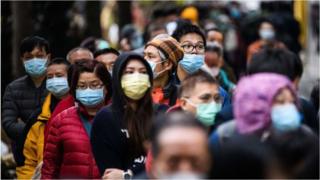[ad_1]

Image copyright
Getty Images
People line up in Hong Kong to to purchase face masks from a makeshift stall
Economies in Asia will see zero growth this year for the first time in 60 years, the International Monetary Fund (IMF) has said.
Its bleak outlook for the region comes as it warns the global economy will face the “worst recession since the Great Depression”.
Asia’s service sector in particular will struggle to rebound, it said.
Airlines, factories, shops and restaurants have been “hard hit” by national lockdowns.
Changyong Rhee, director of the IMF’s Asia and Pacific Department, warned that governments would need to take extraordinary actions as a result.
“This is not a time for business as usual. Asian countries need to use all policy instruments in their toolkits.”
Policymakers must offer targeted support to households and firms hardest-hit by travel bans, social distancing policies and other containment measures, the IMF said.
The drop in growth will be “worse than the annual growth rates throughout the Global Financial Crisis (4.7%), or the Asian Financial Crisis (1.3%),” the IMF said.
The Washington-based lender expects a 7.6% expansion in Asian economic growth next year if containment policies succeed, but added the outlook was “highly uncertain.”
The main function of the IMF is to encourage global trade and to reduce poverty.
Set up after World War Two, it plays an important role in lending money to help developing nations grow their economies. The IMF has 189 member countries and can lend up to $1tn (£797bn) in loans.
Virus could come back
China, which reports its own economic growth figures for the first three months of 2020 on Friday, is expected to grow by 1.2% this year. This is a significant fall from the 6% growth estimate the IMF forecast in January.
“We expect a rebound in economic activity later this year. This is because China is emerging from the outbreak first. Nonetheless, there are clear risks: the virus could come back and normalization could take longer,” the IMF warned.
The world’s second-largest economy is expected to see a rebound in activity later this year, with growth bouncing back to 9.2% next year, the IMF predicts.
The IMF’s bleak warning echoes other multilateral institutions like the World Bank but goes a step further in saying that Asia could likely see zero growth this year, for the first time in 60 years.
For all of us who lived through the Asian Financial Crisis, these warnings will bring back stark memories of currency crashes, property prices tumbling and millions out of work. Wealth that was built up in decades disappearing in a matter of months.
The coronavirus economic crisis will be even worse – our generation’s Great Depression.
The IMF says governments must help these households and firms survive because the impact of the coronavirus will be “severe, across the board and unprecedented”.
But the reality is only a few countries in the region have that sort of financial firepower to do this. Many are grappling with huge populations, limited financial resources, and the very real possibility of political instability as their people get sick, hungry – or both.
[ad_2]
Source link
